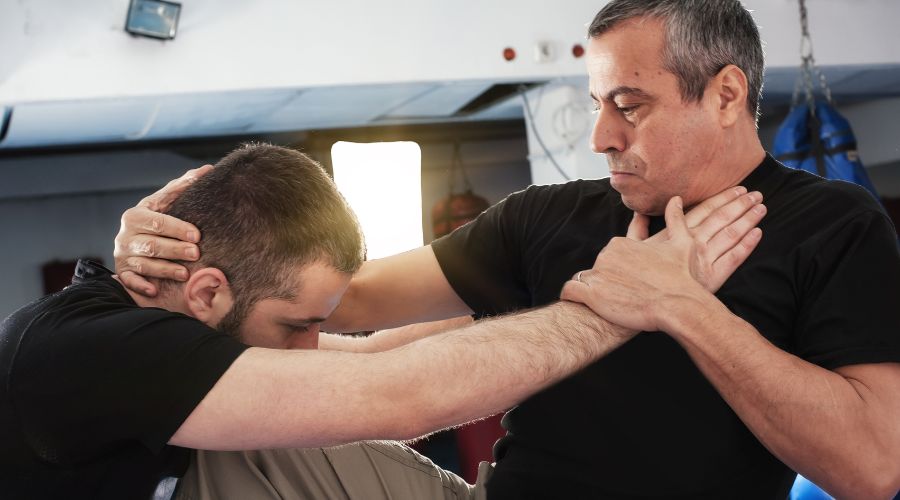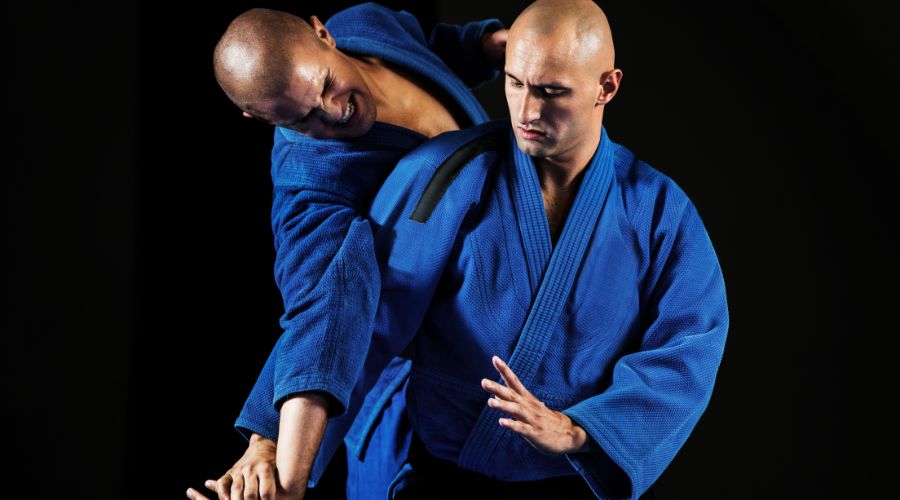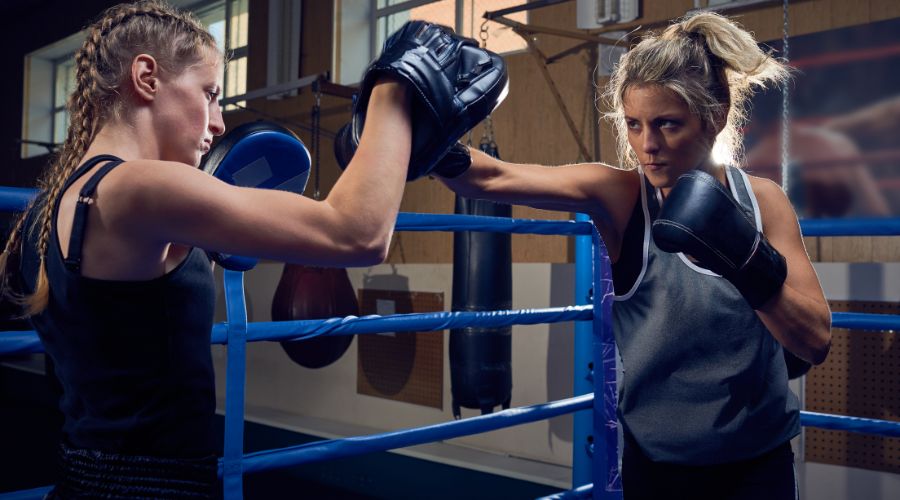The world of self-defense is full of fake styles and imaginary debates, despite the insurmountable evidence we have on the matter. One style that has a stellar track record and has been tested thoroughly in real fights, not just in the theoretical field, is Brazilian jiu-jitsu. But exactly how effective is it for self-defense?
BJJ is very good for self-defense because the techniques and concepts it teaches allow people to control, dominate, and defeat attackers through grappling on the ground. BJJ has been proven effective in countless no-rules fights and MMA, and a big factor in its success is the way of training, prioritizing live sparring and competition.
Of course, BJJ is not perfect when it comes to self-defense, and there are a lot of variables that can tip the scales, but no one can argue it’s more effective than most other martial arts. Still, let’s see exactly what makes it so good and where it falls short.
Is BJJ Good For Self Defense?
Like many martial arts, Brazilian Jiu-Jitsu was created for self-defense, and unlike most of them, it’s still good for its initial purpose. BJJ is a submission-centered grappling martial art that uses technique and leverage to win fights.
On the ground, an untrained person is completely helpless against even mediocre grapplers, and the knowledge of body mechanics and leverage allows big size differences to be negated.
Furthermore, what makes BJJ great for self-defense is that grappling control and the application of painful holds give you the choice of the level of violence you want to apply.
To stop someone with punches, you have to deal enough damage to him, which is not always desired, not to mention It’s usually illegal.
With grappling, you can subdue someone without causing too much harm. Of course, finishing the submissions can also cause serious damage if this is what you want to do. This is why martial arts like judo and BJJ have been so popular with law enforcement and military personnel.
All these principles would be for naught if jiu-jitsu wasn’t trained the way it is. The majority of training time is spent drilling and, more importantly, sparring, called rolling in BJJ.
And if we know anything about martial arts and real combat, the only way to be even moderately prepared for the real thing is by training against resisting partners who are also actively trying to beat you.
Sparring and sports competitions have rules and limitations, unlike real-life situations, but are still the best way to be physically and mentally prepared for the violent nature of real conflict. And BJJ is all about sparring, competitions, and testing its prowess against real opponents.
If you need proof beyond words, just watch the first few UFC events and the dominance of Royce Gracie and other grapplers in the no-holds-barred fights, which were early MMA.
How Effective is BJJ in a Street Fight

BJJ is extremely effective for street fighting, even more so than it is for self-defense. I want to make a distinction between self-defense and street fighting. The two terms are often used interchangeably, but they are not the same thing, although they may have the same starting point.
In self-defense, you or people close to you are attacked, and your primary goal is to remain unharmed and ensure your safety. You can fight in self-defense, but it should be a last resort, and getting away from the situation is usually a better solution when possible.
A street fight is a violent confrontation between two or more people actively trying to hurt each other and win the fight. In this case, all participants in the scrap are willing to fight, or, to say it in legal terms, both parties are consensual.
A street fight may or may not arise from a self-defense situation, but as you can see, there can be quite a difference in the end goal.
In self-defense, your goal is first and foremost to avoid harm, and escaping is very often the best way of doing so. In a street fight, you want to hurt the opponent for various reasons, like anger, reputation, or even a cash prize, and running away satisfies none of those.
With the term clarification over, I can say BJJ is highly effective for street fighting, even more so than for self-defense. After all, jiu-jitsu earned its reputation in countless Vale Tudo or gym challenges in Brazil and the USA, all of which were street fights with limited or no rules.
Grappling shines in a one-on-one fight, and many street fights are exactly that. The point of getting the fight to the ground is to minimize size advantages and take away the chance for single-strike knockouts.
All people have some instinctual ability to throw a punch or kick, albeit sloppy, but their natural instincts on the ground are often the opposite of what’s correct. This is why BJJ has been so successful in street fights and MMA.
The Limitations Of BJJ For Self Defense

As good as BJJ is for self-defense, it’s not perfect. The most glaring shortcoming is the lack of striking. If you are in striking range, you are also in takedown range, and grapplers almost always manage to take down their opponents.
Still, in a real-life situation, dealing with an attacker as fast as possible is the best solution, and there is no faster way of doing so than with a couple of hard punches.
BJJ is a tactical and methodical martial art, which in a one-on-one fight is a fine strategy, but not so much in self-defense, where getting the hell out as soon as possible is what you should do.
Grappling with someone on the ground means you often cannot get up and escape at will.
If there is more than one attacker, the situation becomes even worse. No martial art will enable you to beat four guys, but if you strike and keep your distance, your chances of running away unscathed are drastically higher than if you tangle with someone on the ground.
The shortcomings of BJJ for self-defense are deepened by the prevalence of modern sports BJJ, which has become the most popular form of BJJ. Unlike traditional BJJ, which was used for no-rules fights and took striking into consideration, sports BJJ is a purely grappling contest.
This creates some dangerous habits, like pulling guard and keeping the opponent in mid-range, where punches and elbows are most dangerous. Not to mention kicks and knees on the ground.
If you want to use your BJJ skills to keep you safe in a real-life situation, I strongly advise you to make a clear distinction between what is good for the street and what can be used only in sports.
Some academies still have classes focused on self-defense BJJ, and this is something I strongly endorse.
If you have access to such classes or some MMA-focused BJJ, I strongly advise you to attend at least a few of them to see what works in practice when strikes are involved and what doesn’t.
BJJ vs. Other Martial Arts for Self Defense

No style is perfect for self-defense, and each approach has some flaws. I’ve already showcased some of the limitations BJJ has in real fights, and now we have to see how it compares to other martial arts.
All other styles, for example, boxing and Muay Thai, have advantages and disadvantages over BJJ. But the truth is fights often end up close and in the domain of BJJ. This is why BJJ has an unrivaled track record when it comes to success against other martial arts in one-on-one fights.
In different situations, Muay Thai or boxing may be better than BJJ, but as a whole, jiu-jitsu is perhaps the best self-defense martial art. But this is where MMA comes in. Mixed martial arts take all aspects of fighting and develop them to a significant level, including BJJ.
While the grappling aspect is not as intricate as in BJJ, for self-defense, you don’t really need that much proficiency to defeat the overwhelming majority of people you might have to fight.
But MMA will also teach you a good striking, striking defense, better clinch fighting, and striking on the ground.
So while it still has rules and cannot prepare you for everything that can happen in a real situation, MMA is the best martial art for self-defense because it contains BJJ and many other elements.
But if you don’t want to strike at all, BJJ remains your best bet, especially if trained with self-defense in mind.
Summary
When trained and applied in its original form, Brazilian jiu-jitsu is effective for self-defense. It gives you the ability to overcome bigger opponents and choose the level of damage you want to inflict, and it’s much safer than striking martial arts.
Grappling is sometimes not the best solution because it doesn’t allow a quick escape, but for one-on-one fights, BJJ has been proven to be one of the best styles on the planet.
